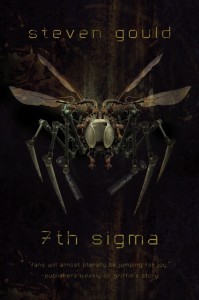Steven Gould has long been one of my favorite writers, with Jumper and Helm in particular being books of his I’ve loved enough to reread. As a matter of fact, I haven’t made much of a secret of the fact that Vanishing Act draws inspiration from Jumper.
As much as I didn’t care for the movie adaptation of Jumper, I was grateful that it paved the way for more novels from Gould. This month, Tor released 7th Sigma, his first book not tied to the Jumper series in more than a decade–unless I’ve missed one somehow.
7th Sigma is a retelling of Rudyard Kipling’s Kim (which I haven’t read). I suspect this is why it felt to me like a more old-fashioned kind of story. I know I’ve read stories like this before–in which we see a character’s development from childhood until he comes into his own, as more of a series of episodes than a story arc. The arc is present, but it’s really the character arc. There isn’t one antagonist or one tangible goal that runs from the beginning of the novel to the end. Think of this as something that could have easily been published serially. More than anything else, it reminded me of Robert Heinlein’s Citizen of the Galaxy.
The SFnal premise of 7th Sigma is–to me, anyway–ridiculously cool and different. Self-replicating robotic bugs that will bore through almost anything to consume metal have settled into the American Southwest, throwing the region into a technological state reminiscent of the wild west–except with all kinds of cool ceramic, epoxy, or composite high-tech gizmos–while life goes on more or less as usual in the rest of the world. Many pioneering types have decided to brave the region instead of moving out, including our protagonist, Kimble.
Kimble is a fun character, because even at the beginning, when he’s just a youngster, you can see that he’s got lightning reflexes and a fundamentally good nature. As he matures, he takes on progressively eviler (Firefox says that’s a real word; well I’ll be!) villains without losing his humble charm. The relationship between him and Ruth, his sensei, is a poignant one. I love how Gould tells the story in tight third and yet manages to make us aware of how attached Ruth has gotten while Kimble manages to miss all the signs.
As always, Gould’s prose is compulsively engaging, making this book hard to put down.
I’m not sure why this novel isn’t marketed more toward teens, beyond the fact that Gould already has an established following of older readers. Folks of any age who like near-future, Earth-based science fiction will like it, but with a young protagonist, I think it has a lot of teen appeal as well.
I kind of suspect we’re about to see Gould become a whole lot more prolific, and I’m looking forward to lots of new books from him.


 Subscribe via RSS
Subscribe via RSS
2 Responses to 7th Sigma